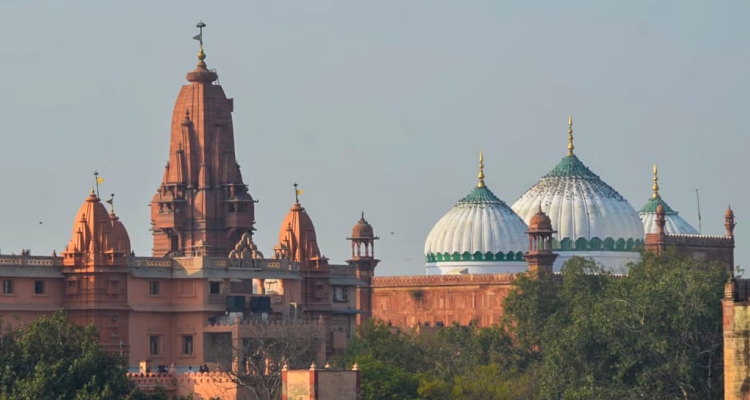
The Krishna Janmabhoomi-Shahi Idgah dispute took another turn on Friday as the Supreme Court agreed to examine a new claim made by Hindu parties.
They argue that the Shahi Idgah mosque, located next to the Krishna Janmabhoomi temple in Mathura, is actually a protected monument under the Archaeological Survey of India (ASI) and therefore cannot be used as a mosque.
The bench led by Chief Justice Sanjiv Khanna and Justice PV Sanjay Kumar issued a notice to the Hindu side in response to an appeal filed by the Muslim side. The appeal challenges a recent Allahabad High Court order that allowed the Hindu parties to amend their original case and also make ASI a party to the dispute.
During the hearing, the court noted that the issue of whether an ASI-protected site can be used as a mosque is already under its consideration. The Court expressed concern that it had earlier directed that no significant interim orders be passed in such matters, yet this was not conveyed to the High Court.
The court also seemed to agree with the High Court’s order allowing the amendment, stating that adding new claims or parties to a case is generally permitted under law. “This isn’t a new case,” the Court said, suggesting the Hindu side is within its rights to update its claims in response to new arguments.
The case will now be heard along with related matters on April 8.
Background Of Dispute
The case began when Hindu devotees filed a civil suit claiming that the Shahi Idgah mosque was built on land considered to be the birthplace of Lord Krishna. The suit was filed on behalf of the deity Bhagwan Shri Krishna Virajman and his followers, seeking the mosque’s removal from the site.
Initially, a civil court dismissed the case in 2020, citing the Places of Worship Act, 1991, which prohibits changing the religious character of places of worship as they stood on August 15, 1947. However, in 2022, the Mathura District Court allowed the suit to proceed, and the case was later moved to the High Court.
New Argument By The Hindu Side
The Hindu plaintiffs claim that the mosque site had already been declared a protected monument in 1920 under the Ancient Monuments Preservation Act by the then Lieutenant Governor of the United Provinces. Therefore, they argue, the 1991 Places of Worship Act does not apply to this site, and it cannot be used as a mosque.
They also sought to include the ASI in the case, which was allowed by the Allahabad High Court in March 2024. The court gave the Hindu side a month to incorporate the amendment and allowed the Muslim side two weeks to respond.
Muslim Side’s Objection
The Muslim side opposed the amendments, accusing the Hindu parties of changing their original case to escape the bar imposed by the 1991 Act. They argued that the Hindu parties were trying to “set up a new case” to sidestep legal restrictions.
In a separate case in December 2023, the Supreme Court directed all courts to avoid passing effective orders or allowing site surveys in religious disputes until the constitutionality of the Places of Worship Act is decided. That direction affects ongoing cases like this one.
Despite that, the Allahabad High Court had allowed consolidation of related suits and permitted amendments in the Krishna Janmabhoomi case. The Muslim side appealed that order, leading to the current proceedings before the Supreme Court.
The outcome of the April 8 hearing could have significant implications for this long-standing religious dispute, which echoes the legal and emotional complexities of similar cases like the Ayodhya Ram Janmabhoomi matter.
Read More: Supreme Court, Delhi High Court, States High Court, International




